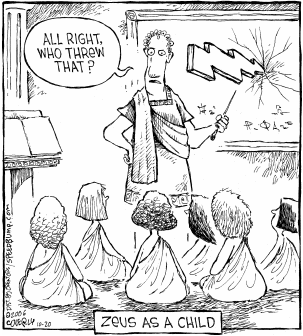
I found this comic (drawn by Martin Pickles) the other day while going through a back issue of
Omnibus magazine. The inspiration comes from the Iliad, where
Sarpedon (a mighty warrior, allied to the Trojans) attacks the Greek camp. Here is how Homer describes the scene:
Even then the Trojans and glorious Hector would not yet have broken through the gate of the wall and its long cross bar, if Zeus the counsellor had not set his own son Sarpedon at the Argives, like a lion on twist-horned cattle. He held the even circle of his shield in front of him... and with two spears in his grip he set out like a mountain lion, who has been long without meat, and his proud heart urges him to break right in to a close-built fold and try for the sheep: even if he finds herdsmen there, watching over their sheep with dogs and spears, he will not run from the pen without an attempt, but either he leaps in and makes his kill, or is himself hit in the first defence by a spear from a quick hand. So then his heart prompted god-like Sarpedon to storm the wall and break through the battlements.Iliad XII
Lion similes are common both in Homer and Virgil; at the beginning of
Aeneid XII Turnus is compared to a lion in a simile that tells us much about his character:
Turnus ut infractos adverso Marte Latinosdefecisse videt, sua nunc promissa reposci,se signari oculis, ultro implacabilis ardetattollitque animos. Poenorum qualis in arvissaucius ille gravi venantum vulnere pectustum demum movet arma leo, gaudetque comantisexcutiens cervice toros fixumque latronisimpavidus frangit telum et fremit ore cruento:haud secus accenso gliscit violentia Turno.Turnus, when he
sees that the Latins, broken by hostile Mars, had become tired, that now he was being forced to fulfil his
oaths and that everyone was seeking him with their
eyes,
burns with an unquenchable fire, and encourages their
spirits. Just like a
lion in the fields of Carthage, suffering from the hunters'
deep wound in his
chest, when it finally picks up the fight, and takes heart, shaking the hairy muscles of its
neck, and he
fearlessly breaks off the piercing spear of the bandit, and roars with its bloody mouth: just like this did the
violence swell in the enflamed Turnus.
Aeneid XII.1-9









